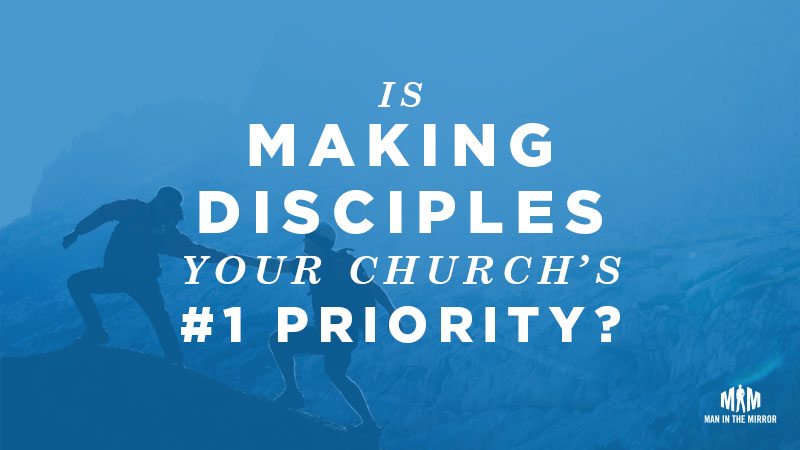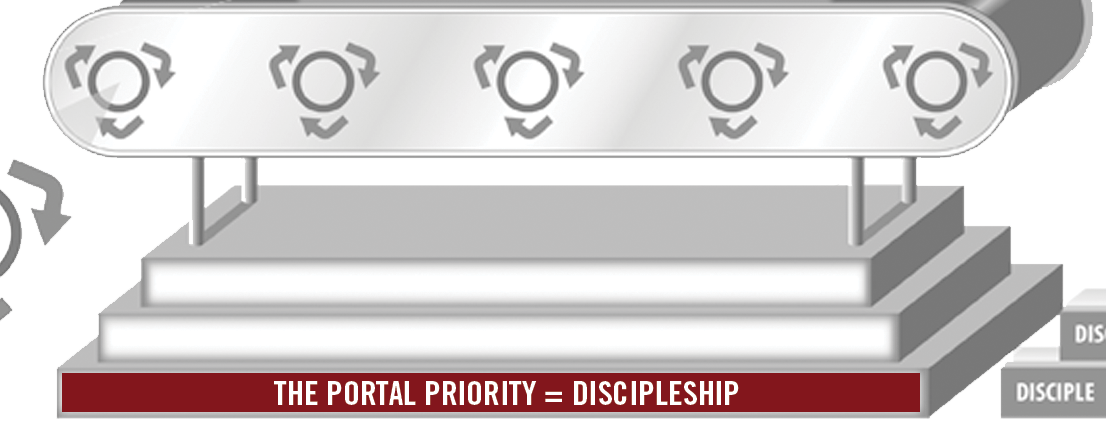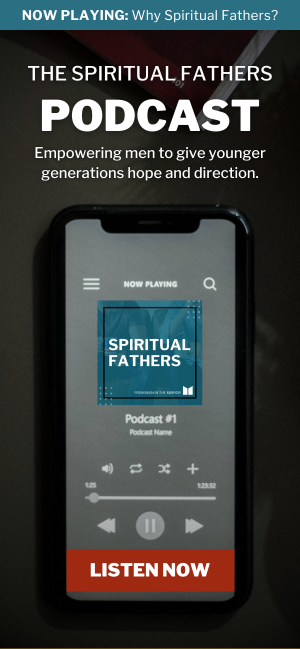Is Making Disciples Your Church’s #1 Priority?
To build a sustainable ministry to men, you need a solid foundation and a clear focus. Yes, men need to be godly fathers, caring husbands, good stewards, and servant leaders. But what is the core issue that should drive your ministry?

By the Man in the Mirror Team
Picture yourself as the president of a 100-person law firm. For years you have recruited lawyers but then left them on their own. Without guidance and training, they have done more harm than good. Unresolved cases have piled up, other law firms consider your firm an embarrassment, the public thinks your incompetent.
Suppose you go to your board of directors and ask to hire another 20 lawyers. They would say, “Are you NUTS? You haven’t trained the lawyers we have. Why would we let you hire more? We have a terrible reputation. In fact, several young people who interned with us have quit the practice. You’re fired!”
A law firm that doesn’t produce capable lawyers is not much of a law firm at all. So what does this mean for a church that doesn’t produce disciples?
Discipleship as the “Portal Priority”
Jesus said, “Go and make disciples…” That’s interesting, because he could have said anything. He didn’t say, “Go and make worshipers.” He didn’t say “Go and make workers.” Nor did He say, “Go and make tithers.” Is Jesus interested in worshipers, workers, and tithers? Of course. But He knew we wouldn’t get worshipers by making worshipers, etc. We get worshipers, workers, and tithers by making disciples.
Imagine a new family has attended your church for three months. What do they think is the first priority—the organizing idea—of your church? One week they heard a sermon about the priority of worship. The next week they heard they need to be cheerful givers. The following week they heard in Sunday school that committed believers go on mission trips. The week after that they were asked during the service to attend evangelism training. The next week in the small group they joined, they learned about compelling needs at the crisis pregnancy center. A weekend seminar greatly emphasized the importance of private study and devotions.
If you were them, what would you think is the first priority? If you picture all these activities written on a whiteboard, it might look like an undifferentiated blob of disjointed activities.
Thinking about this collection of concepts on the imaginary whiteboard, it is helpful to organize them into two sets: methods and outcomes. Creating godly families, service and missions, worship, fellowship, discipleship, evangelism, stewardship, vocation—these all represent outcomes most churches are trying to achieve. This a good sampling of what most churches want their members to understand and live out in a biblical and godly way.
Yet, these are too many areas to focus on. There must be some organizing principle to help people understand, believe, and live out these objectives. That principle is discipleship.
THE BIG IDEA: Discipleship is the portal priority through which all other priorities of a church can be achieved. Only by moving through the discipleship gateway can people truly affect their church and have their church affect them.
For instance, how can a man worship a God he doesn’t know? How could a man be a good steward if he didn’t understand and believe that everything he has is a gift from God—his time, talent, and his treasures?
As we disciple men’s hearts, they start to live out of the overflow of their relationship with Christ. Therefore, we can organize those other efforts by putting discipleship in the center of our white board and drawing arrows out to each of our other priorities.
Remember these activities are not ends in themselves; focus first and foremost on helping people learn and live out what it means to be a disciple.
Discipleship as the portal priority by which every other goal of the church can be accomplished. For example, we don’t preach to make worshipers but rather preach to help a man see God so that he can’t help but worship Him.
For this reason, discipleship is the primary foundation of our No Man Left Behind training model for churches.
Why It Matters
Let’s look at an example of why this mattes.
What steps might a church take to financially support its growing ministries? First, the pastor could preach about the responsibility of church members to tithe and support the work of the church. Next, teachers could teach about it in Sunday school classes and recommend books in the church bookstore; leaders could give all the small-group leaders announcements to read with some Scripture references here and there, even have a financial planning seminar for the church. But if you are preaching, teaching, reading, and announcing just to get the people attending the church to give money, you have a performance orientation.
What’s missing here is discipleship. You’re not creating stewards; you’re creating donors. So what does it mean to disciple men to be good stewards?
Well, first we would preach, teach, and so forth not to guilt or obligate men to give just so we can meet the budget. In Mark 12:30-31, Jesus answers the question, “What is the most important commandment?” by saying, “‘Love the Lord your God with all your heart and with all your soul and with all your mind and with all your strength.’ The second is this: ‘Love your neighbor as yourself.’ There is no commandment greater than these.”
We described a disciple as “called, equipped, and sent”. A man who has answered the call to give his life to Christ and been equipped as a disciple to know God will be motivated to also love God and love his neighbor. That man will respond to a need when it is presented to him, not out of guilt or obligation but out of the overflow of his relationship with Christ.
If you help a man love God with all his heart, soul, mind, and strength, and love his neighbor, then what kind of response will you get from him when you teach about stewardship? Or when you tell him about a need within the body of Christ? You won’t have to tell him what to do or badger him; he will respond out of the overflow of his relationship with God.
Making discipleship the portal priority of our churches is the answer to what ails us. Consider our many systemic problems: divorce, fatherlessness, substance abuse, abortion, sexual violence, suicide, disrespect for authority, hate and division, etc. They all need attention.
Beneath everything, though, is the need for a discipleship reformation of the Christian church. What single activity would have the greatest impact on all of these problems 20 years from now? Discipling men today.
♦♦♦








